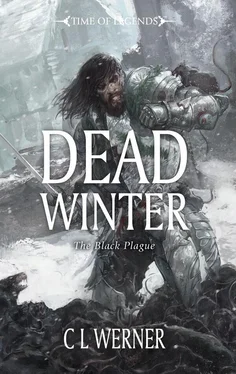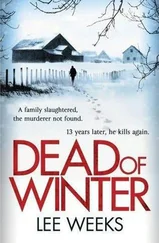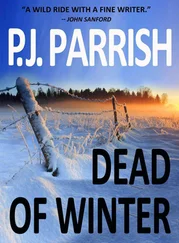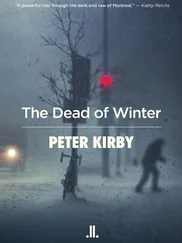C. Werner - Dead Winter
Здесь есть возможность читать онлайн «C. Werner - Dead Winter» весь текст электронной книги совершенно бесплатно (целиком полную версию без сокращений). В некоторых случаях можно слушать аудио, скачать через торрент в формате fb2 и присутствует краткое содержание. Год выпуска: 2012, ISBN: 2012, Издательство: Games Workshop, Жанр: Фэнтези, на английском языке. Описание произведения, (предисловие) а так же отзывы посетителей доступны на портале библиотеки ЛибКат.
- Название:Dead Winter
- Автор:
- Издательство:Games Workshop
- Жанр:
- Год:2012
- ISBN:9781849701518
- Рейтинг книги:4 / 5. Голосов: 1
-
Избранное:Добавить в избранное
- Отзывы:
-
Ваша оценка:
- 80
- 1
- 2
- 3
- 4
- 5
Dead Winter: краткое содержание, описание и аннотация
Предлагаем к чтению аннотацию, описание, краткое содержание или предисловие (зависит от того, что написал сам автор книги «Dead Winter»). Если вы не нашли необходимую информацию о книге — напишите в комментариях, мы постараемся отыскать её.
Dead Winter — читать онлайн бесплатно полную книгу (весь текст) целиком
Ниже представлен текст книги, разбитый по страницам. Система сохранения места последней прочитанной страницы, позволяет с удобством читать онлайн бесплатно книгу «Dead Winter», без необходимости каждый раз заново искать на чём Вы остановились. Поставьте закладку, и сможете в любой момент перейти на страницу, на которой закончили чтение.
Интервал:
Закладка:
The declaration brought protests from every quarter, the room descending into a bedlam of commotion.
‘You can’t expect us to pay this!’ shouted Baron von Klauswitz. ‘The Imperial levies on commerce are already straining the resources of our fields and farms! For every chilling that comes out of the ground, Altdorf is already taking five pfennigs!’
Emperor Boris rose from his throne, smashing his goblet to the floor. ‘Then you will have to manage your resources better!’ He smacked his hand against his chest. ‘We are responsible for defending the sacred empire bestowed upon mankind by Holy Sigmar himself! That is not a responsibility we will suffer lightly! And we will not allow any of our subjects to ignore their responsibility either!’ Boris turned his head, motioning to Lord Ratimir. ‘To guide you in your obligations, I have made an additional decree.’
Lord Ratimir unrolled the scroll and cleared his throat. ‘Let it be herewith noted that there shall no longer be granted an exclusion for that class of peasantry known as Dienstleute .’
The statement provoked an even louder expression of outrage from the noblemen. ‘You cannot be serious!’ roared Baron Thornig. ‘Middenheim alone keeps two thousand Dienstleute to defend the Ulricsberg and the forest around her!’
‘And why do you need so many soldiers to defend your city?’ Emperor Boris challenged. ‘The beastkin have left your forest to ravage the Drakwald! What of Nuln, where there hasn’t been violence in a hundred years? Count Artur has nearly four thousand Dienstleute , many of whom have probably never even held a sword! No! I shall not suffer the Imperial Treasury to be impoverished by greedy nobles trying to aggrandise their personal fortunes by declaring half their peasantry a dienstmann!’
‘We can’t possibly afford to pay for our soldiers as well as our serfs!’ protested Grand Duke Bela, Count of Talabecland.
‘Then don’t retain them as soldiers,’ Lord Ratimir suggested. ‘Put them to work in the fields. Increase the harvest and your yield. Every man who takes up the sword and doesn’t take up the plough is a drain upon resources rather than a creator of wealth.’
‘Many of these men know no trade but that of the sword,’ objected Boeckenfoerde. The Emperor gave his general a warning look, but the warning went unheeded this time. ‘The fathers of many of these men were soldiers, as were their fathers before them. These men wouldn’t know one end of a plough from the other.’
‘It should be an easy choice, then, for the masters of such wastrels to discharge them from service,’ Lord Ratimir said.
Several of the assembled nobles looked appalled at the suggestion. ‘Where would these discharged Dienstleute go? What would they do?’ demanded Baron von Schomberg.
‘Work or starve,’ was the Emperor’s cold answer.
Bylorhof
Nachgeheim, 1111
Temple bells rang through the town’s muddy streets, a doleful peal that echoed over the thatched roofs and far out across the fields and marshes beyond Bylorhof. In this time of calamity, it did not matter if the bells rested within a temple of Shallya or Morr, all the town’s religions were united by common purpose and the edicts of Baron von Rittendahl, the prefect of Bylorhof. The bells were to sound from dawn until noon, warning the peasants that the corpse collectors were making their rounds. It was a time for healthy people to shun the streets and keep behind locked doors, praying to the gods for deliverance from the evil stalking Sylvania. It was a time for those whose household had been reduced by the plague to leave the remains out upon the doorstep for the collectors to bear away.
Few people dared venture upon the streets of Bylorhof while the bells tolled. Even the baron’s soldiers kept inside their towers at such times. Abhorrence of the dead was instinctual in all men, but the fear was magnified if death was brought by some strange and unknown cause. The plague was something new to Sylvania, something unknown in that land of green hills and dense forests. The people cowered before the malignant disease, seeing it as a horror inflicted upon them by supernatural powers.
As he strode the empty streets, the priest felt the weight of his office like a great stone tied about his neck. His heart cracked a little more each time he passed a body lying strewn across someone’s threshold. His eyes misted with pity when he saw the ugly red crosses daubed upon mud-brick walls, marking another home where the plague had struck. He shared in the frustration of the peasants when he saw crude corn-doll effigies lying half-burnt in the mud or the carcass of a shaved cat nailed above a threshold. In their terror, the people turned to every superstition recalled by their Fennone ancestry, evoking any kind of magic to combat the forces of Old Night. Many of the dead lying in the street had ropes tied about their necks, marking them as offerings to Bylorak, the ancient marsh god whose worship persisted even in the face of kinder, more enlightened gods. These bodies would be taken not to the gardens of Morr, but to the quagmire of Bylorhof Marsh, consigned to the muddy deep and the keeping of the god who dwelled there.
The priest smiled sadly as he watched a hay cart come trundling down the lane, bodies piled in its bed like cordwood. He watched it stop outside a mud-brick hut and observed as the men pulling the cart set the yoke down and started lifting corpses from the street. They took no especial precautions, these collectors of the dead, and their wasted frames wore the same woollen breeches and jackets as any peasant. Only the black caps crunched down about their ears denoted their occupation, that and the hollow, sunken faces that stared out from beneath their hats. There was no need for precaution, not for these men. In the minds of friends and family, the corpse collectors were already dead. They were another reason why the streets were empty when the bells tolled. The men who dragged the cart through Bylorhof were already infected by the plague.
The men loaded their grisly burden into the cart. The plague left little of its victims, withering them into desiccated husks. Even for the sickly collectors, it took no great effort to carry their macabre cargo. There were twenty or thirty bodies in the cart this morning, but the collectors were still equal to the task of dragging it down the street in search of more bodies. After a bad night, they might make ten trips between town and the marsh. The priest hoped it hadn’t been a bad night.
Making the sign of Morr as he passed the cart, invoking the protection of his god for the souls of the dead, the priest proceeded through the deserted town, his black robes whipping about him in the crisp autumn breeze. The breeze brought the stink of the marsh slithering through Bylorhof, a smell which was ordinarily as unwelcome as a goblin but which was now considered far more wholesome than the reek of the unburied dead.
The priest, a servant of the god of death, was accustomed to the smell of corpses, but he shared the sentiments of the townsfolk. There was nothing wholesome about this plague and anything that would oppose it should be welcomed.
The priest rounded a corner, noting with some misgiving the gnarled old oak standing in the square ahead. A horrible crime had employed that tree as its centrepiece. In their terror of the plague, the townsfolk were ready to embrace any rumour or superstition. An old-wives tale about dwarfs being able to curse men with hairs from their beards had provoked a mob into lynching the three dwarf smiths residing at Bylorhof Castle. The crime had outraged Baron von Rittendahl and in his anger he had appealed to Count Malbork von Drak for aid. A second tragedy had resulted from that unwise decision. Too disinterested to uncover the perpetrators, von Drak ordered twenty peasants chosen at random and flayed alive, their skins sent to one of the dwarfholds high in the mountains.
Читать дальшеИнтервал:
Закладка:
Похожие книги на «Dead Winter»
Представляем Вашему вниманию похожие книги на «Dead Winter» списком для выбора. Мы отобрали схожую по названию и смыслу литературу в надежде предоставить читателям больше вариантов отыскать новые, интересные, ещё непрочитанные произведения.
Обсуждение, отзывы о книге «Dead Winter» и просто собственные мнения читателей. Оставьте ваши комментарии, напишите, что Вы думаете о произведении, его смысле или главных героях. Укажите что конкретно понравилось, а что нет, и почему Вы так считаете.











